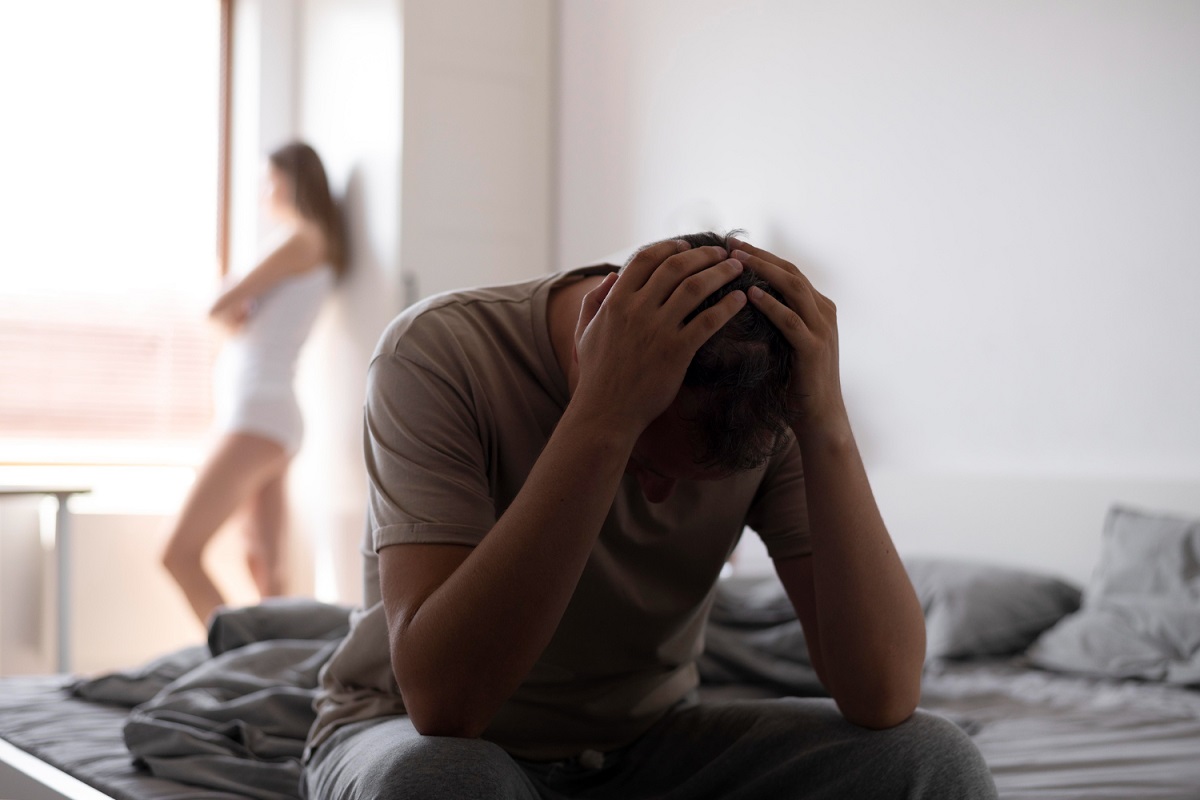Low libido. Image source: Freepik
Low libido, often described as a diminished interest in sexual activity, is a prevalent concern affecting men across various age groups. This comprehensive guide aims to explore the multifaceted aspects of low libido, delving into its intricate causes, subtle signs, effective prevention strategies, and the array of available treatments.
Understanding low libido requires insight into the intricate interplay of physical, psychological, and hormonal factors. Male libido is a complex phenomenon influenced by the delicate balance of these elements. Making it imperative to grasp the nuanced dynamics at play to comprehend the root causes of diminished sexual desire.
Hormonal Imbalances
One primary catalyst for low libido which could result in sexual dysfunction in men is hormonal imbalances, particularly low testosterone levels. Testosterone, a crucial hormone for maintaining healthy sexual function, plays a pivotal role in regulating libido. Imbalances in testosterone levels can contribute to a reduced desire for sexual activity. It is essential to delve into the intricacies of hormonal regulation. This helps to grasp how imbalances can disrupt the delicate equilibrium necessary for a robust libido.
Apart from testosterone, other hormones, such as cortisol and thyroid hormones, can also impact libido. Addressing hormonal imbalances involves a comprehensive understanding of the endocrine system and its influence on sexual health. Exploring these hormonal intricacies lays the foundation for targeted interventions to restore hormonal equilibrium and alleviate low libido.
Psychological Factors
This section explores the psychological nuances that contribute to low libido. And offers insights into fostering mental well-being for improved sexual health.
Psychological factors constitute another significant dimension influencing male libido. Conditions like stress, anxiety, and depression can cast a shadow over one’s sexual desire. And creating a complex interplay between the mind and body. Understanding the intricate connections between mental health and libido is crucial for devising effective strategies to manage and prevent the onset of low libido.
The psychological impact of low libido extends beyond individual well-being to affect interpersonal relationships. Communication, emotional connection, and overall relationship satisfaction play pivotal roles in maintaining a healthy sexual appetite.
Relationship Dynamics
The quality of intimate relationships can significantly influence male libido. Relationship dynamics encompass a myriad of factors, including communication, emotional intimacy, and overall relationship satisfaction. Exploring the correlation between relationship health and sexual desire is essential. This helps to understanding how interpersonal factors contribute to or mitigate low libido in men.
In addition, effective communication within a relationship is paramount for addressing issues related to sexual desire. This involves creating a safe space for open discussions about desires, expectations, and concerns. Furthermore, emotional intimacy and connection play crucial roles in sustaining a robust libido. And emphasizing the importance of cultivating a supportive and communicative relationship. Which helps to prevent and address low libido.
Also, Read: Impotence – Overview, Types, Causes, Signs and Treatment
Signs and Symptoms of Low Libido
Identifying the signs and symptoms of low libido is paramount for timely intervention and management. Reduced spontaneous erections, a decline in sexual fantasies, and a general disinterest in sexual activity are among the indicators of diminished libido. Recognizing these subtle signs allows individuals and healthcare professionals to address the root causes and implement effective strategies for restoring healthy sexual function.
Physical manifestations, such as difficulty achieving or maintaining an erection, may be accompanied by psychological symptoms like anxiety or frustration. This section delves into the nuanced signs and symptoms of low libido. Providing a comprehensive guide for individuals to self-assess and seek professional help when needed.
Medications and Low Libido
This section delves into the intricacies of medication-related low libido. Providing insights into how individuals and healthcare professionals can navigate this aspect of sexual health.
Certain medications can contribute to low libido as a side effect. Antidepressants, antihypertensives, and various other medications may impact sexual desire. Also, It is crucial to explore the potential link between specific medications and diminished libido to inform both patients and healthcare providers about potential side effects.
Understanding how medications influence libido involves examining their mechanisms of action and potential effects on hormonal balance.
Also, Read: Premature Ejaculation – How to Prevent it, Causes and Treatments
Sedentary Lifestyle and Obesity
In this section, I will explore the link between physical activity, obesity, and sexual health. Offering practical insights into lifestyle changes that can positively impact libido.
A sedentary lifestyle and obesity are interconnected factors that can contribute to various health issues, including low libido. In addition, physical activity and maintaining a healthy weight are essential components of overall well-being, influencing hormonal balance and cardiovascular health. Investigating the impact of a sedentary lifestyle and obesity on sexual function is vital for understanding it. And preventing the onset of low libido.
Regular exercise not only promotes physical health. But also contributes to improved mood and reduced stress, addressing psychological factors that may lead to low libido.
Substance Abuse
Substance abuse, encompassing excessive alcohol consumption and recreational drug use, can exert a detrimental impact on sexual desire. Exploring the connection between substance abuse and low libido involves understanding how these substances affect the central nervous system. And also hormonal balance. This section provides a detailed examination of the influence of substance abuse on male libido, emphasizing the importance of addressing these behaviors for overall sexual well-being.
Recognizing the role of substance abuse in low libido requires an exploration of the physiological and psychological effects of various substances. Understanding the potential risks and consequences of substance abuse on sexual health is essential. Especially for individuals seeking to address and prevent the onset of low libido.
Seeking Professional Help
Persistent low libido warrants professional evaluation and intervention. Consulting healthcare professionals, including urologists, endocrinologists, and sex therapists, is crucial for a thorough assessment of underlying causes of low libido. And the development of tailored treatment plans. This section emphasizes the importance of seeking timely professional help to address low libido and restore optimal sexual health.
Healthcare providers play a key role in diagnosing and treating the various factors contributing to low libido. A comprehensive evaluation may involve hormonal assessments, psychological assessments, and discussions about lifestyle factors.
Lifestyle Changes for Libido Enhancement
Implementing lifestyle changes is a proactive approach to enhancing libido and preventing the onset of low sexual desire. Adopting a balanced diet, engaging in regular physical activity, and incorporating stress management techniques are fundamental components of a healthy lifestyle. This section provides practical tips for individuals looking to make positive changes that can positively impact libido and overall sexual well-being.
In addition, nutrition plays a vital role in supporting hormonal balance and overall health. This section explores the significance of a well-rounded diet rich in essential nutrients for maintaining optimal sexual function. Additionally, incorporating regular exercise not only promotes physical health. But also contributes to improved mood and reduced stress, addressing psychological factors that may lead to low libido.
Also, Read: Erectile Dysfunction (ED) – How to Treat It, Causes and Symptoms
Communication in Relationships
Effective communication within intimate relationships is a cornerstone for addressing and preventing low libido. Open and honest communication about desires, expectations, and concerns fosters a supportive environment that promotes sexual well-being. This section delves into the importance of communication in maintaining a healthy sexual relationship. And provides practical tips for couples looking to strengthen their emotional connection.
Creating a safe space for dialogue allows partners to express their needs and concerns, fostering mutual understanding and support. Emotional intimacy, trust, and a collaborative approach to problem-solving contribute to a resilient and satisfying sexual relationship. This section guides couples on the principles of effective communication to navigate challenges related to low libido.
Natural Supplements and Remedies
Some individuals explore natural supplements and remedies to address low libido. While the effectiveness of these interventions may vary, understanding the potential benefits and risks is crucial. This section provides an in-depth exploration of various supplements and alternative therapies, offering insights into their mechanisms of action and their role in promoting sexual health.
Natural supplements such as ginseng, maca root, and Tribulus terrestris have been touted for their potential to enhance libido. However, it is essential to approach these remedies with caution. And consult healthcare professionals before incorporating them into a wellness routine. This section guides individuals in making informed decisions about natural supplements. And provides a balanced perspective on their role in supporting sexual well-being.
Testosterone Replacement Therapy
For cases linked to low testosterone levels, testosterone replacement therapy (TRT) may be a viable option. Understanding the benefits, risks, and considerations associated with TRT is crucial for individuals considering this intervention. This section explores the role of testosterone in sexual health. And provides comprehensive information on the use of TRT as a therapeutic option.
Testosterone replacement therapy involves the administration of exogenous testosterone to address hormonal imbalances. This section discusses the potential benefits of TRT, including improved libido. And sexual function, while also addressing potential risks and considerations. Individuals seeking information on TRT will gain valuable insights into its appropriateness and potential outcomes.
Psychological Interventions
This section guides individuals through the process of seeking psychological interventions for low libido, emphasizing the collaborative approach between therapists and patients.
Psychological interventions, such as cognitive-behavioral therapy (CBT) and sex therapy, can be effective in addressing low libido with a psychological root. This section explores these therapeutic options, providing insights into their methodologies and their role in promoting healthy sexual attitudes and behaviors.
Cognitive-behavioral therapy focuses on identifying and modifying negative thought patterns and behaviors that may contribute to low libido. Sex therapy, on the other hand, involves discussions about sexual concerns and the development of coping strategies.
Couple’s Counseling
Couples counseling can play a vital role in addressing low libido within the context of a relationship. This section delves into the benefits of couple’s counseling. And explores the approaches used by therapists to facilitate communication and understanding between partners.
Couple counseling provides a structured and supportive environment for couples to explore and address sexual concerns. The therapeutic process involves identifying and addressing underlying issues, improving communication, and fostering emotional intimacy. This section offers insights into what couples can expect from couples counseling and how it can contribute to a healthier and more satisfying sexual relationship.
Prevention Strategies
Preventing low libido involves adopting a multifaceted approach that considers lifestyle factors, regular health check-ups, and fostering positive relationship dynamics. This section provides a comprehensive guide to preventive measures, empowering individuals to take proactive steps to maintain optimal sexual health.
Regular health check-ups are a fundamental aspect of preventive care, allowing for the early detection and management of health issues that may contribute to low libido. This section emphasizes the importance of routine medical examinations, including hormonal assessments and overall health screenings, as part of a proactive approach to sexual well-being.
Importance of Regular Health Check-ups
Regular health check-ups are essential for early detection and management of health issues that may contribute to low libido. This section explores the significance of routine medical examinations, emphasizing the role of healthcare providers in assessing overall health and identifying potential factors contributing to low libido.
Health check-ups may involve hormonal assessments, blood tests, and discussions about lifestyle factors. Early intervention based on the findings of these check-ups can contribute to the prevention and effective management of low libido. This section guides individuals on the importance of proactive healthcare-seeking and the collaborative approach required for optimal sexual health.
Role of Mental Health in Libido Maintenance
Maintaining good mental health is crucial for a healthy libido. This section explores strategies for stress reduction, anxiety management, and overall mental well-being to support sexual health. Understanding the connection between mental health and libido is essential for individuals looking to maintain a robust and satisfying sexual life.
Stress reduction techniques, such as mindfulness and relaxation exercises, can positively impact both mental health and sexual desire. Additionally, addressing underlying psychological concerns through therapy or counseling contributes to a resilient and flourishing libido.
Empowering Men for Libido Health
Empowering men with knowledge about the causes, signs, prevention, and treatment of low libido is key to fostering a healthy and satisfying sexual life. This comprehensive guide concludes by reinforcing the importance of education, proactive healthcare seeking, and open communication for individuals to take charge of their sexual well-being.
Empowerment involves understanding one’s own body, recognizing potential risk factors, and being proactive in seeking appropriate care. This section serves as a call to action, encouraging men to prioritize their sexual health, engage in open dialogue with their partners, and collaborate with healthcare professionals for comprehensive and personalized care.
The Symphony of Hormones: Decoding the Intricacies of Libido
Delving into the intricate world of low libido unveils the symphony of hormones orchestrating this complex phenomenon. From testosterone’s pivotal role in sexual desire to the delicate interplay with cortisol and thyroid hormones, understanding hormonal intricacies forms the cornerstone of tackling diminished libido. This guide takes a unique approach by unraveling the physiological ballet within the endocrine system, shedding light on how hormonal imbalances can disrupt the delicate equilibrium necessary for a robust libido. By gaining insights into this hormonal symphony, individuals are equipped to navigate the intricate landscape of low libido with a tailored understanding that goes beyond conventional discussions.
The dynamic nature of hormones extends beyond their physiological impact, influencing both mental and emotional facets of sexual health. As we explore the psychological implications of hormonal imbalances, we unveil a holistic perspective that combines science and sensibility. Recognizing how hormones shape not only physical responses but also mental well-being establishes a comprehensive foundation for addressing low libido. Armed with this unique understanding, individuals can embark on a personalized journey toward optimal sexual health, recognizing the nuanced connections between hormones and the intricacies of the human psyche.
Beyond the Bedroom: Lifestyle Choices and Their Impact on Libido
In the quest for sexual wellness, this guide transcends the bedroom, acknowledging the profound impact of lifestyle choices on libido. A sedentary lifestyle and obesity emerge as interconnected factors influencing not only physical health but also sexual function. By exploring the intricate link between physical activity, weight management, and libido, this section provides a unique perspective on how lifestyle choices can be transformative in addressing low libido. Incorporating regular exercise is not just about physical well-being; it becomes a powerful tool for reducing stress, enhancing mood, and addressing the psychological factors contributing to diminished sexual desire.
Additionally, substance abuse is dissected as a lifestyle choice with repercussions on libido. From excessive alcohol consumption to recreational drug use, understanding the physiological and psychological consequences of substance abuse forms a unique facet of this guide. By recognizing how lifestyle choices extend beyond mere habits to influential determinants of sexual health, individuals are empowered to make informed decisions that resonate beyond the confines of the bedroom. Armed with this unique lens, the guide offers practical insights into adopting healthier lifestyle practices, encouraging individuals to chart a personalized course toward optimal sexual well-being.
Relationship Resonance: Unveiling the Dynamics of Intimacy
This guide transcends the individual realm, delving into the intricate dance of relationship dynamics and their profound impact on libido. A satisfying intimate life is not solely an individual endeavor; it is intricately woven into the fabric of shared experiences, communication, and emotional connection. By exploring how the quality of intimate relationships influences libido, this section provides a unique perspective on the importance of relationship resonance in sexual wellness. Effective communication, emotional intimacy, and relationship satisfaction emerge as pillars that go beyond the individual, shaping the collective experience of intimacy.
Moreover, the guide navigates through the role of couple’s counseling, offering a unique viewpoint on how professional intervention can contribute to addressing low libido within a relationship. By emphasizing the collaborative approach between partners in therapy, this section underscores the transformative potential of relationship-focused interventions. As individuals embark on the journey toward optimal sexual health, recognizing the resonance between individual and relational aspects becomes crucial. Armed with insights into the dynamics of intimacy, couples can navigate challenges together, fostering a shared path toward fulfilling and satisfying intimate experiences.
Conclusion – Navigating the Path to Sexual Wellness
Achieving sexual wellness necessitates a comprehensive understanding of the intricate factors impacting low libido in men. This guide has delved into diverse dimensions, encompassing hormonal imbalances, psychological factors, lifestyle choices, and relationship dynamics, offering a comprehensive overview of the nuanced nature of low libido. Armed with knowledge and proactive strategies gleaned from this resource, individuals can embark on a purposeful journey toward optimal sexual health.
Whether addressing hormonal fluctuations through medical interventions or fostering improved communication and lifestyle habits, this guide serves as a valuable roadmap. Empowered with insights, individuals can make informed decisions, taking control of their sexual well-being with confidence. And a renewed sense of agency. As they navigate the complexities of low libido, individuals are equipped with the tools needed to prioritize and enhance their intimate life, ensuring it is both fulfilling and satisfying.











